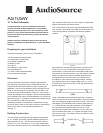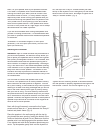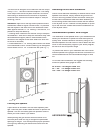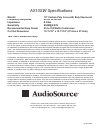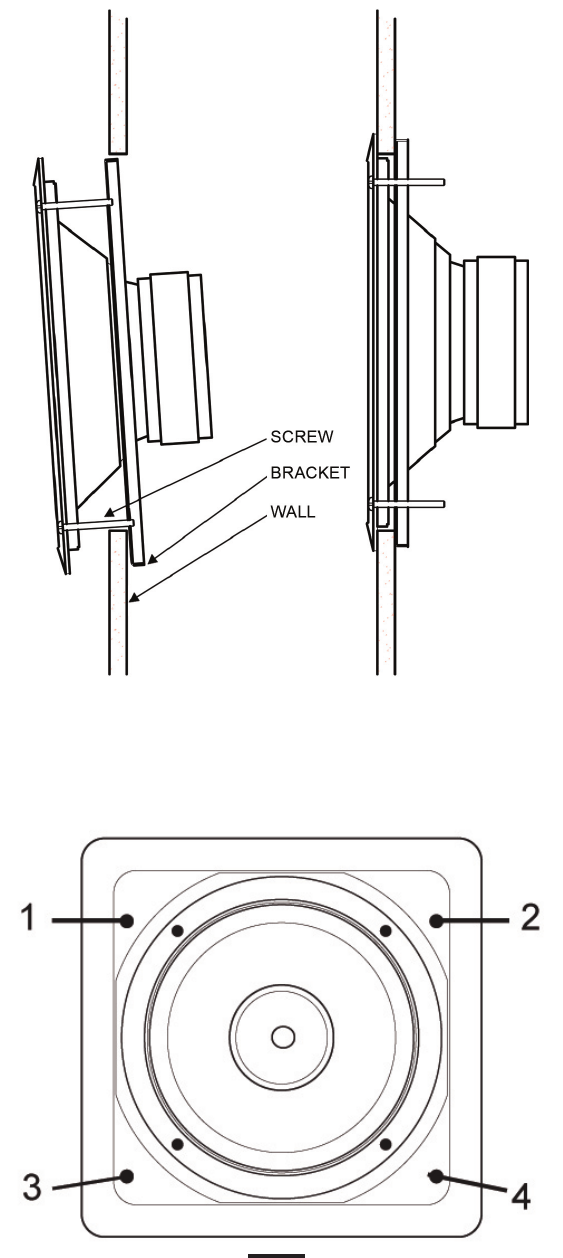
out, the top of the “Easy-In” bracket should just clear
the top of the drywall cut-out. Next gently lift and center
the AS10SW into the cutout, and begin to tighten the 4
“Easy-In” bracket screws. (Fig. 5)
Tighten the four mounting screws in the same manner
until the speaker is properly aligned and held tight to the
wall surface. Caution: Do not over tighten! (Fig. 6)
Next, run your speaker wire to your speaker locations.
A UL rated CL3 speaker wire is recommended when
running wire inside your walls (such as Phoenix Gold
Innovative Home SS162W*). In many areas it may be
required by code. When running your speaker wire you
should avoid having the speaker wire run parallel to the
120V power lines to avoid picking up hum and interfer-
ence from the power service. If the speaker wire needs
to cross a 120V power line at a right angle, this is accept-
able and should not create a problem.
If you are uncomfortable with running the speaker wire
yourself in existing construction, it is recommended that
you retain a qualifi ed custom home installation specialist
or electrician.
*Available in 3 convenient lengths: 50’ mini-spool
(M1650W), 100’ mini-spool (M16100W), and 250’ bulk
spool (SS162W/250).
Installing the Subwoofer
Installation Tip!
To further enhance the performance of
your AS10SW speakers, the wall stud cavity where you
plan to place your speakers can be stuffed with a gener-
ous quantity of fi berglass insulation. If un-insulated, stuff
the area above and under the speaker opening with 6”
thick insulation to a depth of approximately 2 feet begin-
ning 1 foot above and 1 foot below the speaker opening.
If the insulation is foil or paper backed, face the backing
away from the AS10SW speaker. The addition of this
insulation will help to prevent the unwanted transfer of
sound into the otherwise large and resonant cavity of the
un-insulated wall.
It is now time to connect the speaker wire to the
AS10SW. Your speaker wire is usually coded to identify
each conductor as either positive or negative. This can
be by color coding, or one conductor may have a printed
marking or at least a rib along one edge that you will not
fi nd on the other. Identify which type of polarity coding
that your wire is using. You must carefully observe that
the positive terminal of the speaker output on your ampli-
fi er is connected to the positive terminal of the AS10SW
speaker. Likewise, the negative terminal of the amplifi er’s
speaker output should be connected to the negative ter-
minal of the AS10SW speaker.
Next, with the grill removed, unscrew the four frame
screws so that there is a 1” space between the “Easy-In”
bracket and plastic frame (Fig. 4).
Place the speaker in the wall opening with the top tip-
ping toward the room opening, resting the bottom of the
frame on the bottom drywall cut-out. Make sure that the
speaker wire is not hanging against the speaker where
it can vibrate and rattle as the speaker reproduces your
music. Tip the speaker gently back into the drywall cut-
Figure 5
Figure 6
Figure 6
Figure 4



